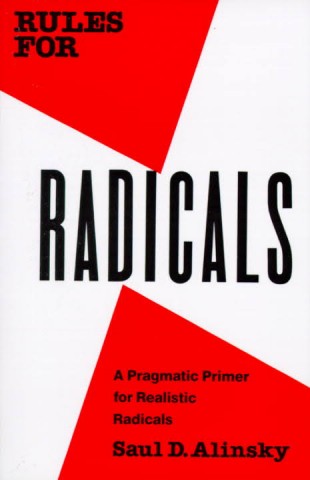Rules for Radicals
Saul Alinsky was one of the most influential community organizers, activists and rabble-rousers of his time (1909-1972). His most well known work is "Rules for Radicals: A Pragmatic Primer for Realistic Radicals" (1971). The book provides a wealth of interesting examples of community organizing, these stories and experiences make the book well worth the read, as do Alinsky's reader-friendly approach of having various lists of rules and principles to work with. He begins his work by situating his approach:
- "As an organizer I start from where the world is, as it is, not as I would like it to be. That we accept the world as it is does in any sense weaken our desire to change it into what we believe it should be – it is necessary to begin where the world is if we are going to change it to what we think it should be. This means working in the system." (p. xix)
About his book he says that: "What follows is for those who want to change the world from what is it to what they believe it should be. The Prince was written by Machiavelli for the Haves on how to hold power. Rules for Radicals is written for the Have-Nots on how to take it away" (p. 3). Alinsky deals with ethics (means and ends) and terminology (power, self-interest), without delving theory but focusing upon his experiences. The fourth chapter turns to the education of an organizer, which includes a list of traits and descriptions, as well as this interesting aside:
- "There was a time when I believed that the basic quality that an organizer needed was a deep sense of anger against injustice and that this was the prime motivation that kept him going. I now know that it is something else: this abnormal imagination that sweeps him into close identification with mankind and projects him into its plight. He suffers with them and becomes angry at the injustice and begins to organize the rebellion." (p. 74)
About community organization, he writes:
- "The first step in community organization is community disorganization. The disruption of the present organization is the first step toward community organization. Present arrangements must be disorganized if they are to be displaced by new patterns that provide the opportunities and means for citizen participation. All change means disorganization of the old and organization of the new." (p. 116)
- "The organization has to be used in every possible sense as an educational mechanism, but education is not propaganda. Real education is the means by which the membership will begin to make sense out of their relationship as individuals to the organization and to the world they live in, so that they can make informed and intelligent judgments. The stream of activities and programs of the organization provides a never-ending series of specific issues and situations that create a rich field for the learning process." (p. 124)
On participation, he explains:
- "We learn, when we respect the dignity of the people, that they cannot be denied the elementary right to participate fully in the solutions to their own problems. Self-respect arises only out of people who play an active role in solving their own crises and who are not helpless, passive, puppet-like recipients of private or public services. To give people help, while denying them a significant part in the action, contributes nothing to the development of the individual. In the deepest sense it is not giving but taking – taking their dignity. Denial of the opportunity for participation is the denial of human dignity and democracy." (p. 123)
In the middle class:
- "The middle classes are numb, bewildered, scared into silence. They don't know what, if anything, they can do. This is the job for today's radical – to fan the embers of hopelessness into a flame to fight… It is a job first of bringing hope and doing what every organizer must do with all people, all classes, places, and times – communicate the means or tactics whereby the people can feel that they have the power to do this and that and on." (p. 194)

